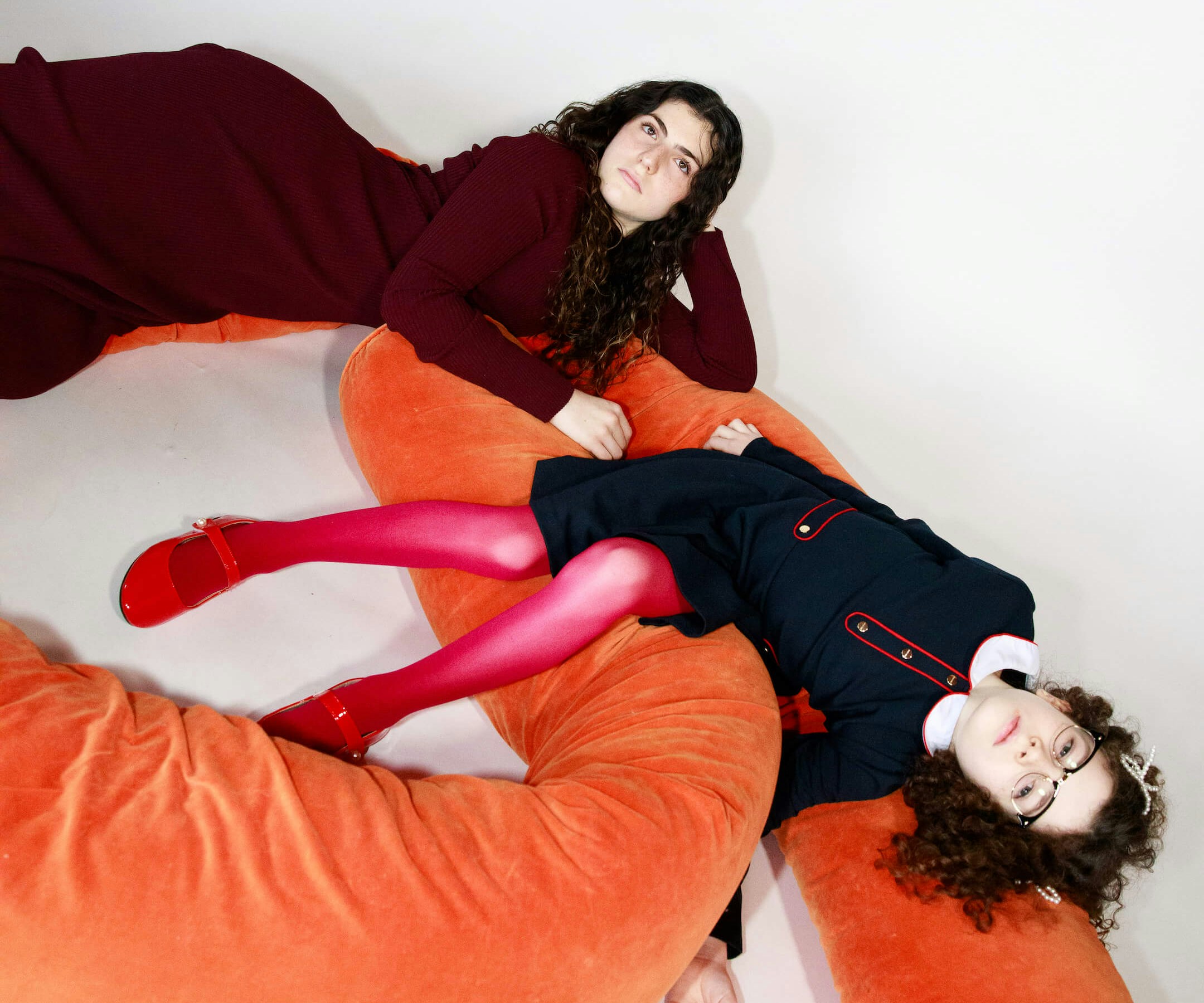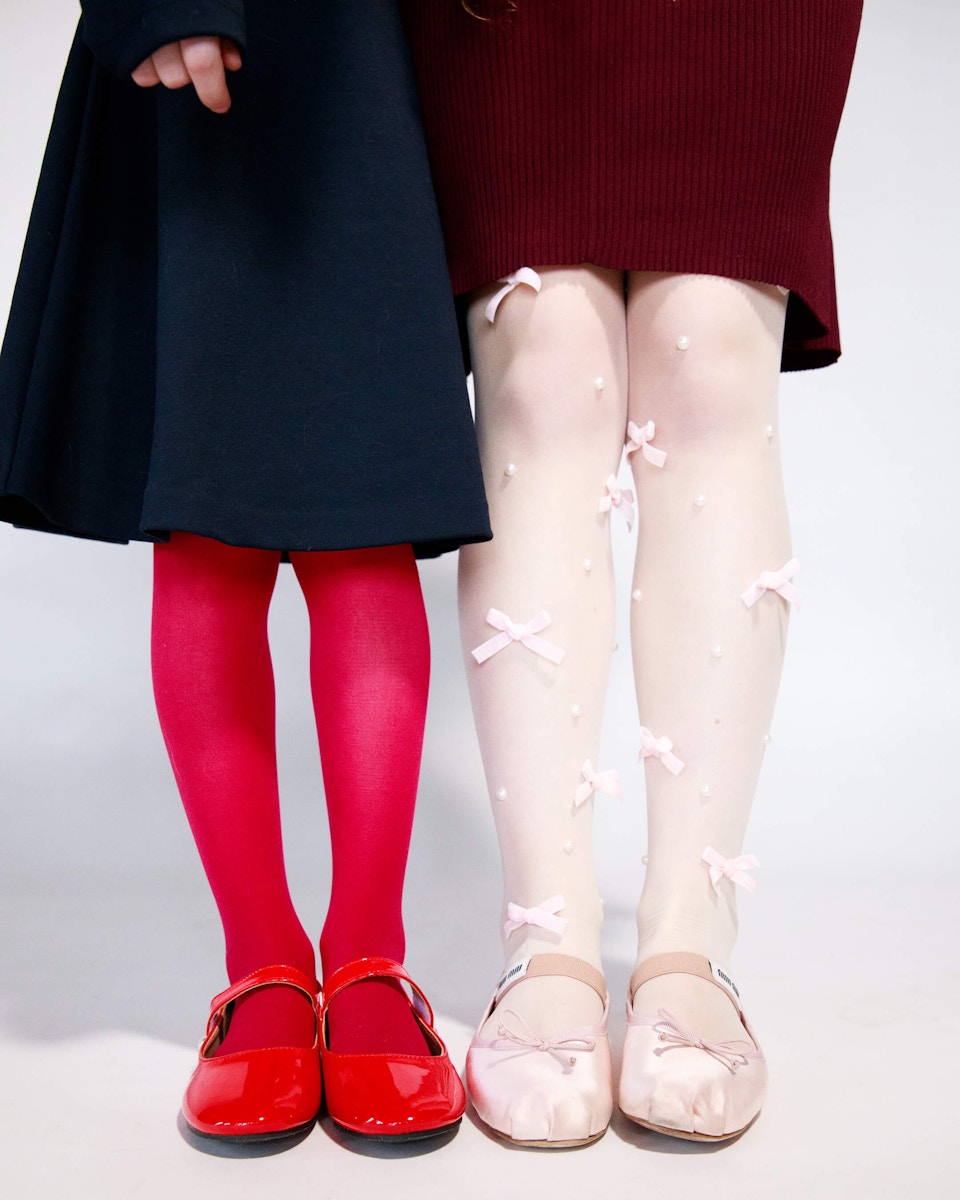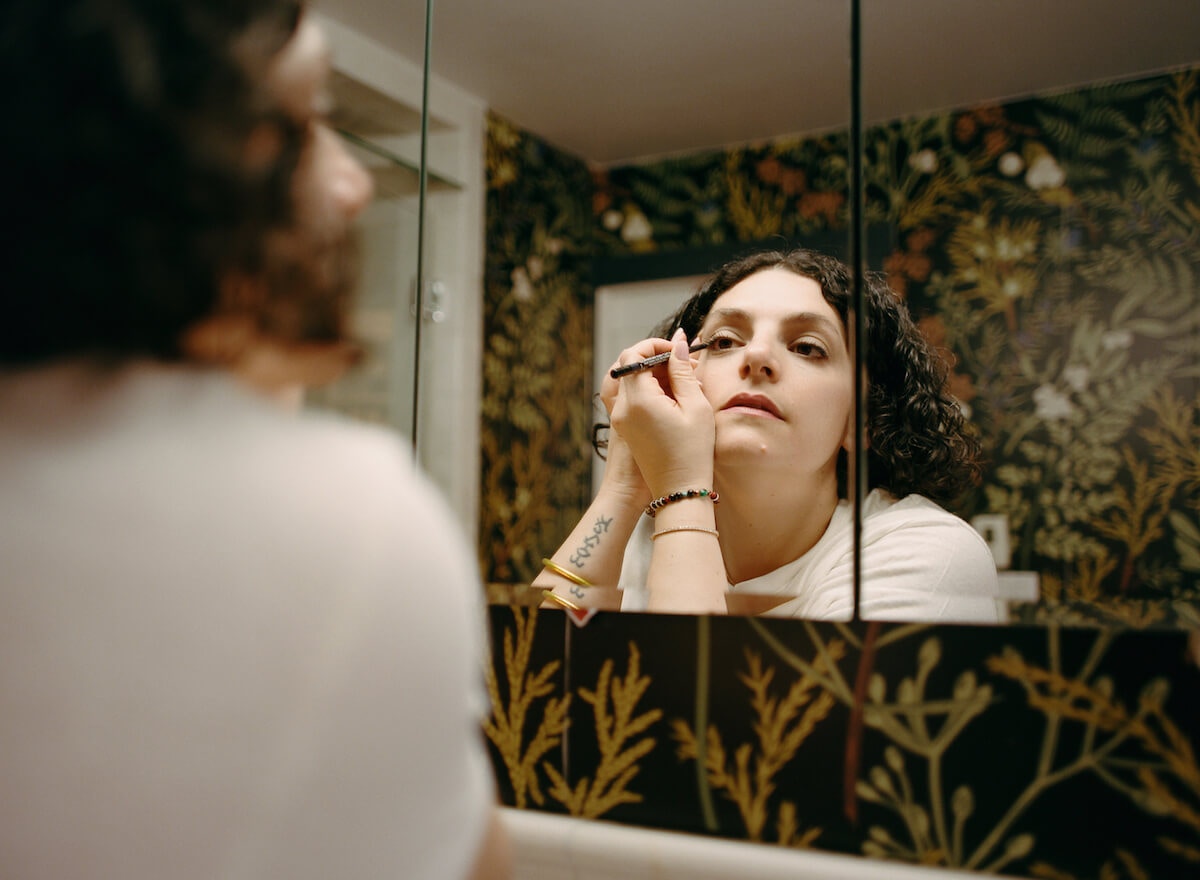
Getting Sticky With Céline Semaan
Photos by Todd Johnson & Shana Jade Trajanoska , Words by AnaMaria Glavan
Everything is political. Everything. From the clothes we wear, to the food we ingest, to the online images that we see, like, and share. Peel back the layers of everyday life—even just a little—and you begin to realize how interconnected it all is: how injustice is systemic, how brands profit off of genocide, how fast fashion and exploitation go hand-in-hand. As Céline Samaan puts it: “The lifting of illusions. That’s what we are all witnessing.”
Céline Semaan is the Creative Director of Slow Factory Foundation, a boundary-pushing organization that encompasses movements, art, and installations. Everything Is Political is one of its most urgent subsets, laser-focused on longform journalism and amplifying dialogue-driving work, including activism. At its core are two guiding tenets: engagement and education. Because if everyday citizens don’t feel confident to speak out regarding injustice, how can we expect real change? People don’t need to be eloquent or perfect, but they do need to feel empowered to speak.
Below, Céline talks about how colonialism continues to shape our everyday systems, how genocide remains profitable for a select few, how capitalism has convinced us that we’re plagued by the original sin of 'existence debt,' and how raising children with whimsy is a step toward a better generation.


Colonialism is neither dead nor buried
The world is uprising to injustice at an accelerated pace that we haven’t experienced before. The support for Palestine is international. It's palpable. I think Palestine has connected the dots pretty rapidly on all the things: fashion, entertainment, politics.
Francesca Albanese published a report detailing how many brands and organizations, including charities, are profiting from genocide. When you look at who owns these brands, you can see clearly how fashion and entertainment and politics are connected in profiting off of injustice.
That’s why someone like Anna Wintour is holding on to dear life for her empire not to fall apart, because once that narrative shifts toward something more progressive, it threatens to unravel the systems that benefit from oppression, including fashion brands and fast fashion.
When we were first talking about sustainability over a decade ago, we were trying to show how fast fashion is connected to colonialism. I wrote about it in The Cut. The trade routes used for importing and exporting materials today are mapped identically to colonial trade routes. Colonialism isn’t a thing of the past—it’s an economic structure that’s still very much alive. And now, through genocide, we’re seeing it as a human rights crisis too.
How do we make these connections? We continue explaining. We continue mapping them out. And once people start seeing the correlation, then there is an action that is being taken; whether it's boycotting, minimizing purchases, organizing differently around supporting independent designers and so on and so forth.
Shattered illusions: a domino effect
Future generations will remember this massive injustice. It will not be erased. It will not be forgotten. It will not be brushed under the carpet and wished away while they rebuild the “Middle East Riviera,” as Trump wants to do in Gaza. It will not happen.
It will always be haunting to remember what they are currently doing — the mothers who are starving, their children dying of hunger. We are witnessing it, and we are unable to create a direct action as much as we would like. The flotilla carrying baby formula was intercepted. Activists were taken against their will. They were kidnapped, abducted, tortured, and then released.
The lifting of illusions. That’s what we are all witnessing. The illusions we once believed that the government had our best interest at heart, that there is a red line, that racism doesn't exist, that feminism will win. Now we’re seeing that feminism is very selective about who qualifies as being worthy of protection or inclusion. All of these illusions have been falling for the past decades, one after the other. And people are reckoning with their awareness, reckoning with their consciousness, reckoning with their own spiritual awakening.
The more awareness we can bring to these topics, the more solidarity we can show to mothers in Gaza, Sudan, Congo, Haiti, Ethiopia, Tibet, Kashmir. The more we can show up for one another as women, as mothers, as feminists. That is the proposition of Slow Factory: this witnessing, solidarity, and connection.

"The more awareness we can bring to these topics, the more solidarity we can show to mothers in Gaza, Sudan, Congo, Haiti, Ethiopia, Tibet, Kashmir. The more we can show up for one another as women, as mothers, as feminists. That is the proposition of Slow Factory: this witnessing, solidarity, and connection."

Why are activists held to a higher standard than the President?
I don't want to enter this dialogue with us feeling guilt and feeling hypocritical, because ultimately that means we are all expecting ourselves to be perfect. We're expecting our actions to be perfect. We're expecting our activism to be perfect and it's impossible to be perfect in anything that we achieve and do.
The reason many people refuse to talk about global injustices—Gaza, Sudan, Congo, oppression, colonialism, imperialism, fascism—is because they can’t hold themselves accountable. Or they don't want to. They feel flawed, like they’re making mistakes. And that shame becomes silence. That shame turns it into a taboo. They expect themselves to be perfect in addressing these topics, which is unrealistic. Even for activists.
And activists are held to unattainable heights of accountability. They're expected to be more accountable than the President of the United States. We have a person in office that has raped and harassed and sexually violated women and yet is still in power. They are not held to impossible standards. But activists are. They’re expected to live a sanctified life, a purified life, and that's why you see folks, the citizens of the world, not being at ease engaging in solidarity or in activism because they are expecting scrutiny. They want to fly under the radar.
When you embrace that you are imperfect, and are humble about it, then there's less taboo in addressing political topics. One of the main criticisms people throw out is: You’re talking about the Congo… on your iPhone. It’s a gotcha moment. But we don't want to be shamed into silence. And I think that's the battle currently, to defy this shame that is being imposed upon us.
As mothers, we can understand this instinctively. When we say to a child, This is wrong, we don’t want to inflict tremendous guilt for a so-called mistake. In fact, we don’t even address it as a mistake. We try to explain it from an educational point of view and provide a pathway for the child to move through the moment. This is exactly what we need to do for our society. That, too, is an act of mothering.
Capitalist Eden and original sin: existence debt
The United States has fabricated an artificial fear against all things socialism, talking about it as communism and the red scare. It’s well documented that the US spent hundreds of billions of dollars on the fabrication of fear against socialist movements.
Capitalism limits our imagination. You spend your life proving your worth through becoming a workaholic. Then when you step out of this hamster wheel when you have your first child, you have an identity crisis. That's what happened to me. What am I worth if I can't work? Because in the beginning, I couldn't work as much as I was used to.
I am conditioned into believing that I have a debt to pay for my own existence, which is wrong. When we start seeing ourselves as sacred beings, things shift in our mindsets and we can imagine a world where we have more third spaces: more libraries, more activities, more time to travel and discover the world. It's unheard of right now to even imagine that you have time to spend with your kids and play with them.
"Capitalism limits our imagination. You spend your life proving your worth through becoming a workaholic. My generation spent their time proving their worth. Then when you step out of this hamster wheel when you have your first child, you have an identity crisis. That's what happened to me. What am I worth if I can't work?"



Fairy godmothers and motherhood muses
When I moved back to Brooklyn, my eldest went to an incredible daycare led by a woman named Mariola. I talk about her all the time. She's Polish and has had a tremendous impact on my life. Her approach to raising children is based on radical existence—being unapologetically present, deeply connected to the wildness of being alive. She is the human embodiment of Women Who Run With the Wolves. She is this wise, wild, magical fairy godmother. She mothered me into being a mother.
Ultimately, there were a lot of times where I was afraid. Being a parent is extremely challenging. You’re the adult and you can’t cower or let the child rule all over you because then there are no boundaries. And she's the first person to explain to me that boundaries are like a hug around your child. You hug them with your boundaries and the boundaries that you create for them.
Mariola gave me permission to listen to my intuition, the voices that we're taught to repress and not listen to because they might be wrong. But in becoming a mother, intuition is the leader in the family.
Everyday living should be sprinkled with whimsy
There’s a lot of spirituality in how I mother. Children respond to that, because by default, they are deeply spiritual. They remember the thin veil between the spirit world and the physical world. Reverence for that connection—to nature, to ourselves as nature—that’s how I teach climate justice. It’s a spiritual connection.
In our home, there’s a lot of whimsy. In the words of Alejandro Jodorowsky, there’s psychomagic, where we commune with nature, write words, burn prayers, work with water. These are things that in another era may have been considered witchcraft. But for us, they are just how we honor life. And often, it’s the children who lead. They’ll say, Let’s make a flower bouquet and give it to the fairies.
That kind of presence is also a luxury. Many of our mothers didn’t have it. My mom raised us displaced while being in Montreal and working long hours. She didn’t have the time or space to be whimsical, but when she did we cherished it. She was on her feet for three decades working with people and it shows. She sacrificed big parts of her dreams to raise a family classic immigrant story. When she did have time to play, it was rare and special. Now, as a grandmother, she has the time to be herself. Watching her play now is beautiful.
I also don’t always have that luxury either. Sometimes I don’t have the time I wish I had with my kids. And this ties back to systemic issues: oppression, colonialism, capitalism. In the U.S., there’s no maternity leave fo example. A woman gives birth and is expected to return to work while she’s still healing.

"There’s a lot of spirituality in how I mother. Children respond to that, because by default, they are deeply spiritual."


Fast-paced at Slow Factory
Right now, Slow Factory is in a space of exploration and transformation. We’ve worked tirelessly for the past 13 years defining a space that, all of a sudden, has become part of the mainstream. In a way, that’s a success. But it also forces us to imagine the next 20 years of Slow Factory in a world in constant turmoil and changes. And how do you do that while also operating in humanitarian rapid-response mode? We need to carve out time and space to rethink things, and that’s where the political comes in. Building a flexible infrastructure for cultural freedom requires for us to go at different paces depending on the situations.
It’s a space for analysis, critical thinking, and movement journalists around the world who are documenting, analyzing, and proposing steps forward when it comes to human rights and climate justice—which we now understand are one and the same, or at the very least deeply intersectional. That’s the work Slow Factory has been laying the groundwork for over the past 13 years.
What allegiance?
I tell my kids everything. I explain the world to them in a way they can understand, without lying. We have meaningful conversations about colonialism, dominant cultures, the erasure of Indigenous voices, land practices, and the natural world. And they understand and contribute greatly to the conversation. They’ve started observing patterns and now speak up at school.
They ask meaningful questions, especially when they notice the contradictions in what the educational system is teaching. The first moment of defiance came when they were asked to pledge allegiance to the flag in public school. Instead, they knelt. They had seen others do it online, and they understood: there's no allegiance to be pledged until everyone has access to this freedom that the United States is selling us.